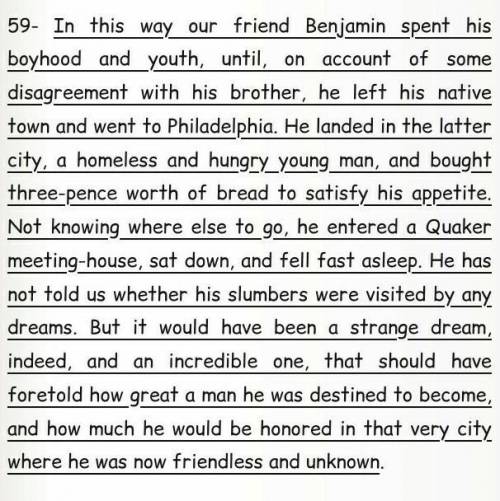
English, 23.05.2021 19:50 luisaareli6298
Hawthorne uses anecdotes in his Biography of Benjamin Franklin to amuse his readers and reveal the character of Ben Franklin. How does the anecdote in Sec. 59 reveal Franklin's character? A. It tells us that Franklin was a religious man and what religion he belonged to. B. It shows Franklin's humble beginnings and sets up a contrast with his later success and fame. C. It shows that Franklin as young man was a wanderer with no purpose or ambition in life.


Answers: 1


Other questions on the subject: English

English, 21.06.2019 15:30, quantamagic
In the chaste adventures of joseph: a comedy, the garden outside the potiphar’s home symbolizes growth and natural beauty, and it highlights the
Answers: 3

English, 21.06.2019 16:00, isabhb4227
That pattern of stanzas from which a poem is built is called ?
Answers: 2

English, 22.06.2019 00:30, ia28735
Asap read the bottom. use these 7 words to make 2 similies, 2 personification, 2 metaphors, and 1 of any so much backpack toaster drummer beach heart bicycle microwave examples: (if the examples were a quarterback, a wave, and stars) 1. the quarterback is a cheetah running down the field. (metaphor) 2. like a wave, the birds in autumn move through the air crashing into invisible shores. (simile) 3. the stars danced in the night sky. (personification) remember to write using complete, correctly capitalized sentences for each of the examples you provide. also, proofread and spell check carefully.
Answers: 1

English, 22.06.2019 01:00, fufnun9757
Read the excerpt from act 1 of a doll's house. helmer: nora! [goes up to her and takes her playfully by the ear.] the same little featherhead! suppose, now, that i borrowed fifty pounds today, and you spent it all in the christmas week, and then on new year's eve a slate fell on my head and killed me, and— nora: [putting her hands over his mouth]. oh! don't say such horrid things. helmer: still, suppose that happened, —what then? nora: if that were to happen, i don't suppose i should care whether i owed money or not. helmer: yes, but what about the people who had lent it? nora: they? who would bother about them? i should not know who they were. helmer: that is like a woman! but seriously, nora, you know what i think about that. no debt, no borrowing. there can be no freedom or beauty about a home life that depends on borrowing and debt. we two have kept bravely on the straight road so far, and we will go on the same way for the short time longer that there need be any struggle. nora: [moving towards the stove]. as you , torvald. how does the interaction between helmer and nora advance the plot? nora realizes that helmer will completely disapprove of her having borrowed money, so she has to continue to keep it a secret from him. nora realizes that she and helmer have the same ideas about financial issues, and the conversation brings them closer together later in the play. helmer realizes that nora is more responsible with money than he originally thought, and he trusts her more with finances later in the play. nora realizes that helmer knows a lot more about borrowing and lending, and she will seek his input later when she needs it.
Answers: 1
You know the right answer?
Hawthorne uses anecdotes in his Biography of Benjamin Franklin to amuse his readers and reveal the c...
Questions in other subjects:


Social Studies, 03.08.2019 19:20



Mathematics, 03.08.2019 19:20


Mathematics, 03.08.2019 19:20






